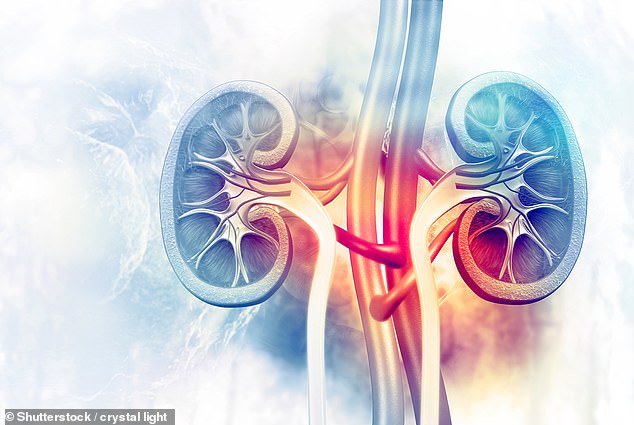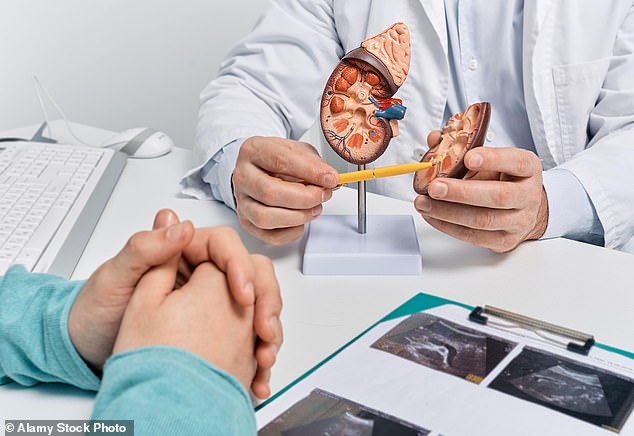Kidney stones can be painful and hard to treat, but scientists believe they have hit on a new treatment that may beat them for good – using gut bacteria.
After a month, all the participants given the bacteria had lower oxalate levels than the placebo group, reported the journal Science.
Dr Whitaker, who led the trial, said making the bacteria reliant on porphyran provided a ‘kill switch’ to clear it – simply by stopping the daily powder.
Further research is planned to find ways to make the engineered bacteria work for longer to provide a long-term preventative approach.
Dr Whitaker believes genetically altering gut bacteria could be used to treat ‘or prevent a wide range of gut and non gut-related diseases’.
Professor Chris Eden, a consultant urologist at the Royal Surrey County Hospital, welcomed the research but said it was in its early stages.
‘Potentially, this may be useful for the subset of patients with recurrent oxalate kidney stones who don’t respond to a low-oxalate diet,’ he says.
Currently, treatment of kidney stones depends on where they are, their size and whether they are causing symptoms.

Kidney stones are hard objects made of minerals and salts in urine
‘Larger stones within the kidney typically cause symptoms [pain and/or recurrent infection] and can be broken with external shockwave lithotripsy [a form of ultrasound], but the fragments then have to pass,’ said Professor Eden.
Dr David Riglar, an assistant professor of engineering biology at Imperial College London, told Good Health: ‘This is an important piece of research.
‘Testing these types of technologies in human clinical trials is critical for the field.’
However, he pointed out ‘there are many unknowns about how our gut bacteria interact with our bodies, which raises some challenges for microbiome engineering.
‘Some of these – such as the fact the engineered bacteria persisted in the microbiome of some participants of the study, even after their food source was removed – were highlighted by this paper.’
Meanwhile, researchers at Imperial College London are investigating the fact that bacteria act differently in areas of the gut that are inflamed – such as in IBD or where there is a tumour.
‘Our goal is to design engineered probiotics [beneficial bacteria] that can diagnose and treat these gut problems on site – but only when required,’ says Dr Riglar.
After a month, all the participants given the bacteria had lower oxalate levels than the placebo group, reported the journal Science.
Dr Whitaker, who led the trial, said making the bacteria reliant on porphyran provided a ‘kill switch’ to clear it – simply by stopping the daily powder.
Further research is planned to find ways to make the engineered bacteria work for longer to provide a long-term preventative approach.
Dr Whitaker believes genetically altering gut bacteria could be used to treat ‘or prevent a wide range of gut and non gut-related diseases’.
Professor Chris Eden, a consultant urologist at the Royal Surrey County Hospital, welcomed the research but said it was in its early stages.

Most kidney stones pass out of the body naturally, but this process can cause extreme pain
‘Potentially, this may be useful for the subset of patients with recurrent oxalate kidney stones who don’t respond to a low-oxalate diet,’ he says.
Currently, treatment of kidney stones depends on where they are, their size and whether they are causing symptoms.
‘Larger stones within the kidney typically cause symptoms [pain and/or recurrent infection] and can be broken with external shockwave lithotripsy [a form of ultrasound], but the fragments then have to pass,’ said Professor Eden.
Dr David Riglar, an assistant professor of engineering biology at Imperial College London, told Good Health: ‘This is an important piece of research.
‘Testing these types of technologies in human clinical trials is critical for the field.’
However, he pointed out ‘there are many unknowns about how our gut bacteria interact with our bodies, which raises some challenges for microbiome engineering.
‘Some of these – such as the fact the engineered bacteria persisted in the microbiome of some participants of the study, even after their food source was removed – were highlighted by this paper.’
Meanwhile, researchers at Imperial College London are investigating the fact that bacteria act differently in areas of the gut that are inflamed – such as in IBD or where there is a tumour.
‘Our goal is to design engineered probiotics [beneficial bacteria] that can diagnose and treat these gut problems on site – but only when required,’ says Dr Riglar.
Most kidney stones pass out of the body naturally, but this process can cause extreme pain.
What’s more, according to NHS data, around half of all people who’ve had kidney stones will develop them again within the following five years.
Now researchers have found a way to ‘engineer’ gut bacteria to tackle the underlying cause of recurrent stones in some people, and have successfully tested their approach in a new trial.

Currently, treatment of kidney stones depends on where they are, their size and whether they are causing symptoms
And the team, from Stanford University in the US, believe the approach could be used to treat other conditions – from inflammatory bowel disease (IBD) to cancer – and are already testing it for those with irritable bowel syndrome (IBS).
Kidney stones can vary in size from a tiny grain of sand to a golf- ball shape and are formed of minerals, such as calcium, which can build up in the organ.
The Stanford team made genetic changes to a strain of gut bacteria (Phocaeicola vulgatus) to encourage it to break down a substance, oxalate, that’s key to the formation of stones in many.
Oxalate, found in foods such as spinach, nuts, dark chocolate and tea, can bind to calcium and form a crystal-like stone, explains Dr Weston Whitaker, a microbiologist at Stanford University.
The bacteria was tweaked so that it broke down the oxalate and fed off a type of carbohydrate (porphyran, found in red seaweed) that most gut bacteria can’t digest, so enabling it to survive among the resident bugs, which often wipe out any bacteria introduced to the body by out-competing them for food.
In the recent trial, 12 people who have enteric hyperoxaluria (meaning their body absorbs too much oxalate, causing frequent kidney stones) and 39 healthy people were given a bacteria pill or a placebo daily for a month.
They were also given porphyran powder mixed with water with an over-the-counter proton pump inhibitor (medication usually given for reflux) to reduce the production of stomach acid that might harm the bacteria.
After a month, all the participants given the bacteria had lower oxalate levels than the placebo group, reported the journal Science.
Dr Whitaker, who led the trial, said making the bacteria reliant on porphyran provided a ‘kill switch’ to clear it – simply by stopping the daily powder.
Further research is planned to find ways to make the engineered bacteria work for longer to provide a long-term preventative approach.
Dr Whitaker believes genetically altering gut bacteria could be used to treat ‘or prevent a wide range of gut and non gut-related diseases’.
Professor Chris Eden, a consultant urologist at the Royal Surrey County Hospital, welcomed the research but said it was in its early stages.
‘Potentially, this may be useful for the subset of patients with recurrent oxalate kidney stones who don’t respond to a low-oxalate diet,’ he says.
Currently, treatment of kidney stones depends on where they are, their size and whether they are causing symptoms.
‘Larger stones within the kidney typically cause symptoms [pain and/or recurrent infection] and can be broken with external shockwave lithotripsy [a form of ultrasound], but the fragments then have to pass,’ said Professor Eden.
Dr David Riglar, an assistant professor of engineering biology at Imperial College London, told Good Health: ‘This is an important piece of research.
‘Testing these types of technologies in human clinical trials is critical for the field.’
However, he pointed out ‘there are many unknowns about how our gut bacteria interact with our bodies, which raises some challenges for microbiome engineering.
‘Some of these – such as the fact the engineered bacteria persisted in the microbiome of some participants of the study, even after their food source was removed – were highlighted by this paper.’
Meanwhile, researchers at Imperial College London are investigating the fact that bacteria act differently in areas of the gut that are inflamed – such as in IBD or where there is a tumour.
‘Our goal is to design engineered probiotics [beneficial bacteria] that can diagnose and treat these gut problems on site – but only when required,’ says Dr Riglar.